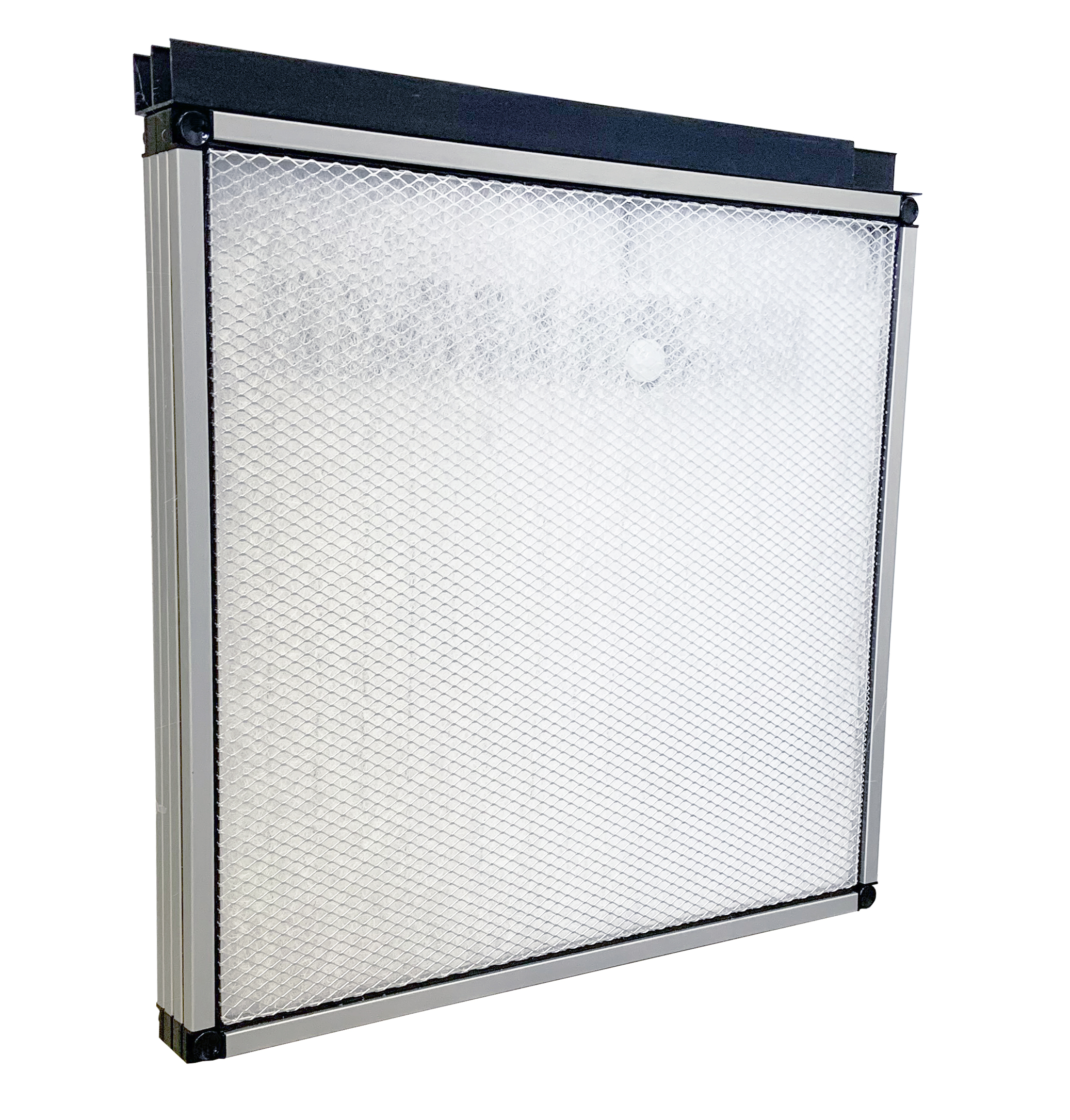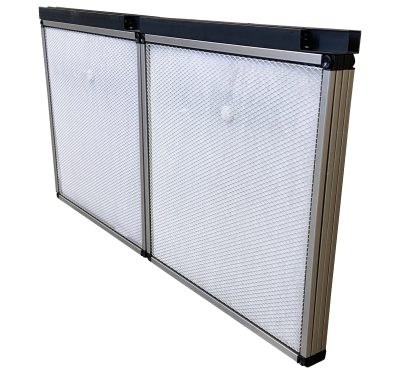
The ECOairflow M-Series™ is our new line of higher performance 2″ electronic air cleaners. Patent pending filtration technology delivers superior filtration results with lower resistance to flow (pressure drop) than most other types of filters.
M-SeriesTM filters don’t make you choose between the advantages of passive pleated filters and powered ones. They bring the advantages of both in a single unit. Just like with water, the best, most efficient air quality is achieved with a multi-technology approach.This means superior performance with reduced operating costs.
They are perfect for use in applications demanding MERV 13 or higher. Model 2300 M Series filters are intended for use where face velocity rates are typically 500 FPM or more. They deliver better dust holding and longer pad life than comparable filters.
M-Series™ filters can be used as a stand-alone solution or in combination with other filtration products to meet specific application criteria.
MERV
Things to consider when choosing the right electronic air filter for your building. It must have a minimum rating of MERV 13 to ensure it meets recommended filtration performance levels. M-Series™ filters are available in configurations from MERV 13 to MERV 16
True MERV certification, as defined by ASHRAE, can only be achieved at a lab certified to perform these tests using ASHRAE certified test dust. ASHRAE certified dust contains a large carbon component which ensures any tested filter will be able to capture particulate containing organic or black carbon.
Most electronic air filters cannot achieve a true high MERV rating when powered. Their design allows ASHRAE certified dust to interfere with their electronics. Manufacturers often test filters either unpowered or using alternate types of dust with no carbon. Unpowered tests are still considered a true MERV rating if ASHRAE certified dust is used. Tests run with alternate dust types are not.
We believe touting unpowered test results indicates the filter may not perform as effectively in a carbon rich environment, when powered. We also believe test results achieved using non-carbon dust indicate the filter may not function as effectively in a carbon rich environment, when powered.
| MERV 52.2 Rating | INPUT VOLTAGE | ||||||
| POWERED | UNPOWERED | APPENDIX J | PRESSURE DROP 300/500FPM |
NORMAL | RANGE | APPARENT POWER |
POWER CONSUMPTION |
| 13 | 13 | 13-A | .09/.18” | 24 Volts | 18-32 Volts | 2VA | 2 Watts |
| 14 | 14 | 14-A | .13/.27” | 24 Volts | 18-32 Volts | 2VA | 2 Watts |
| 15 | 15 | 15-A | .12/.28” | 24 Volts | 18-32 Volts | 2VA | 2 Watts |
| 16 | 16 | 16-A | .18/.38” | 24 Volts | 18-32 Volts | 2VA | 2 Watts |
| *Testing performed at Blue Heaven Technologies | |||||||
Appendix J
Many projects now specify filters should be able to perform at MERV 13 or higher when tested using the Appendix J protocol as part of 52.2 testing. Appendix J is a protocol developed by ASHRAE to provide the best indication of how a filter will perform in the field. M-Series™ filters have been proven in third party testing to perform at MERV 13-16 levels when tested using the Appendix J conditioning protocol.
Low Pressure Drop
Low resistance to airflow is key to saving energy, longer pad life, and protecting expensive HVAC equipment. M-Series™ filters were developed specifically to achieve superior filtration at the lowest resistance to flow. Typical high performance pleated filters achieve their performance using a tight weave which has high resistance to flow. That means shorter pad life. These filters must be replaced more frequently, resulting in higher material and labour costs. Filter operating costs relate directly to pressure drop. The higher the resistance to flow, the more energy required to operate at recommended airflow levels. High pressure drop is known to increase stress on HVAC systems. This can result in increased downtime and repair costs. Commercial air handlers typically operate at face velocities of 500 FPM. When comparing traverse resistance levels, be sure all test results were achieved at 500 FPM. Reputable manufacturers state face velocities with their test numbers. If the face velocity is not shown, don’t make assumptions.Simple Maintenance
Maintenance is simple. Pad sets are designed to last almost indefinitely, but when they reach their capacity, changing them is easy. Just open the filter, carefully remove, and discard the old pad set and then drop in a new one. It’s that simple.

How They Work
Ultrafine particles are defined as PM (0.1) (less than .1 microns). Particles this small pose more serious health risks. Unlike larger particulate, they can easily pass through the body’s natural barriers to enter the blood stream and reach vital organs. PM (0.1) is widely known to be associated with increased risk of lung, cardiovascular, and other major health issues.
M-Series filters use a patented pending combination of collector materials coupled with Electronic Polarization Technology (EPT) to trap airborne contaminates. They can effectively trap particles as small as .001 microns in size.
PM (0.1) are not effectively captured by passive pleated filters. As mentioned above, particles this small need to be charged so they will attach to nearby collector media to be trapped and eliminated. Model 2300 M Series filters can effectively capture ultrafine particulate from major sources such as non-exhaust automotive pollution and forest fires. They can also effectively capture presented viruses such as COVID, most bacteria, and many other harmful pathogens.
Green Building Compliant
M-Series™ filters have features which make them able to qualify for credits/points under various green building standards such as National Green Building Standard™, The international WELL building institute™, International Living Future Institute, Passivehaus, and USGBC®/LEED. Where possible, recyclable materials are used in both the permanent frame and the periodically discarded collector pads used to trap and contain pollutants.Zero Ozone Compliant
All M-Series™ filters are certified by ETL to be compliant with UL2998 ozone standards. UL2998 was developed to ensure device ozone levels stay below .0005ppm (5ppb). This is the most stringent standard available today. It is 1/10th of the regulatory level of .005ppm (50ppb) as required by UL867. Ul2998 is required for air cleaning devices by ASHRAE 62.1-2019, Section 5.7.1 and is recommended by both CDC and US EPA.